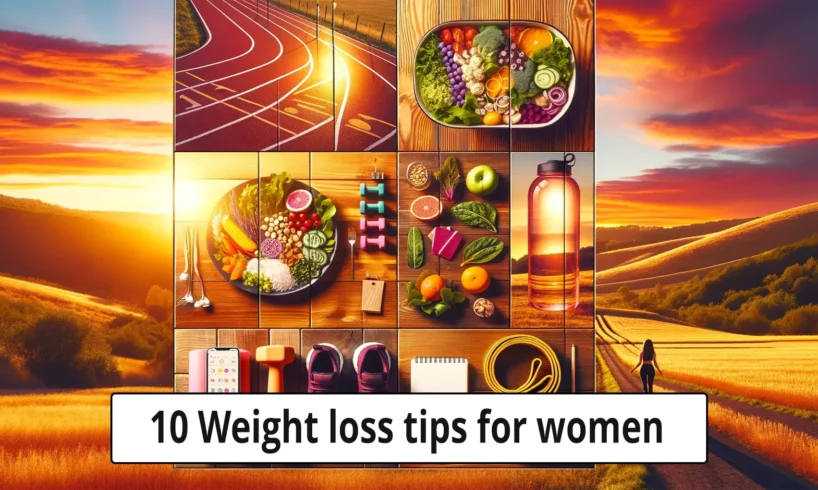
10 Weight Loss Tips for Women
Achieving and maintaining a healthy weight has a myriad of benefits, including boosting self-esteem, improving physical health, and enhancing overall quality of life. However, weight loss can seem like a daunting task, especially with the numerous myths and misconceptions that surround it. As such, we have compiled a comprehensive guide of 10 effective weight loss tips for women.
Demystifying the Components of Effective Weight Loss
- Eating Right: It’s not just about eating less but eating smart. Eat fruits, veggies, whole grains, and lean proteins. Cut down on sugary snacks, fatty foods, and too much junk. Think of food as fuel for your body.
- Moving More: Exercise is key. You don’t have to run marathons or lift huge weights. Find something you enjoy, like walking, dancing, or biking, and do it regularly. The goal is to get moving and keep your heart rate up.
- Staying Consistent: Keep at it. Success doesn’t happen overnight. Please stick to your healthy eating and exercise, even when it feels tough. The progress you make over time is what counts.
- Drinking Water: Swap out sugary drinks for water. It keeps you hydrated, helps you feel full, and cuts a lot of empty calories.
- Getting Enough Sleep: Lack of sleep can mess with your hunger hormones and make you crave unhealthy food. Aim for 7-9 hours of good sleep each night.
- Limiting Alcohol: Booze has a lot of hidden calories. Cutting back can help you control your calorie intake and make healthier choices.
- Seeking Support: Whether it’s friends, family, or a group with similar goals, having support can boost your motivation and keep you on track.
- Consulting a Professional: If you’re stuck or need tailored advice, talking to a dietitian or personal trainer can provide personalized tips and strategies.
1. Balanced Diet
A balanced diet is the cornerstone of any weight loss plan. It involves incorporating a variety of foods from all the food groups and focusing on lean proteins, whole grains, fruits, and vegetables. A balanced diet ensures your body gets the necessary nutrients while keeping calorie intake in check.
2. Regular Exercise
While diet plays a crucial role in weight loss, regular exercise is equally important. It not only aids in burning calories but also in building muscle, which can boost metabolism.
3. Stay Hydrated
Water plays a critical role in regulating body functions and maintaining overall health. It also helps manage hunger and prevent overeating.
4. Get Enough Sleep
When you don’t sleep enough, it messes with your body’s signals that tell you when you’re hungry or full. This can make you want to eat more, which might lead to gaining weight. So, it’s important to make sure you’re getting enough sleep.
Not sleeping enough can make your body crave foods that aren’t good for you, like ones high in sugar or fat. This is because your body’s looking for a quick energy boost. Also, when you’re tired, you might not feel like exercising, which can also lead to gaining weight.
Getting the right amount of sleep helps your body stay on track. It’s not just about avoiding weight gain; good sleep helps your muscles repair themselves and keeps your mind sharp. Most people need about 7-9 hours of sleep a night, but everyone’s a bit different.
To sleep better, try going to bed and waking up at the same time every day. Make your bedroom a cosy place for sleep, and try to chill out before bedtime, like by reading or taking a bath. Staying off your phone or computer right before bed can also help. If you make sleep a priority, it can make a big difference in how you feel and live.
5. Mindful Eating
Mindful eating is all about really noticing what you’re eating, how much of it you’re eating, and understanding why you’re eating it. When you eat this way, you’re less likely to eat too much, and you tend to pick healthier foods.
When you’re not paying attention, like if you’re eating in front of the TV or scrolling through your phone, it’s easy to eat more than you mean to. You might end up eating a whole bag of chips without really thinking about it. But if you’re mindful, you’re paying attention to every bite, which can help you notice when you’re full and stop eating before you overdo it.
Mindful eating means using the best diet for weight loss which also forces you to consider why you’re reaching for food. Are you actually hungry, or are you bored, sad, or stressed? Sometimes, we eat just to feel better, not because we need food. Recognizing this can help you deal with your feelings in other ways that don’t involve food.
Here’s a tip: try to eat without distractions. Sit down at a table, not in front of the TV or with your phone. Look at your food, smell it, and think about its taste and texture as you eat. This can help you enjoy your food more and feel more satisfied with less.
Eating mindfully takes practice, but over time, it can help you build healthier eating habits. It’s not about following strict rules. It’s more about being more connected to your eating experiences, which can lead to better choices and a healthier relationship with food.
6. Reduce Stress
Stress can make us turn to food for comfort, which might lead to eating more than we need and gaining weight. It’s important to find better ways to deal with stress, like yoga, meditation, or even getting lost in a good book.
When you’re stressed, your body is in a fight or flight mode, making you crave foods that give you a quick burst of energy and pleasure, like sweets or fast food. However, these foods can lead to weight gain when eaten too often. Finding activities that reduce stress can help you avoid this trap.
Yoga is great because it helps you focus on your breathing and body, pulling your mind away from whatever’s stressing you out. Meditation works by clearing your mind, helping you feel more relaxed and less inclined to stress. Even something as simple as reading can take your mind off things and help you unwind.
Instead of reaching for food when you’re stressed, try one of these activities. Go for a walk, listen to some calming music, or try some deep breathing exercises. These strategies can help you manage stress more healthily.
Remember, it’s all about finding what works for you. Stress is a part of life, but how you handle it can make a big difference in your health and well-being. Finding a healthy outlet for stress can not only help you avoid emotional eating but also improve your overall mood and quality of life.
7. Limit Alcohol
Cutting back on alcohol is a good idea if you’re watching your weight. Drinks like beer, wine, and mixed drinks can pack a lot of calories, and it’s easy to overlook them. If you do drink, try to keep it to a minimum. This doesn’t mean you have to give it up entirely, but maybe choose lighter options or drink less often. Remember, all those extra calories can add up pretty fast, and before you know it, they can contribute to weight gain.
8. Stay Consistent
Sticking to your routine is key when you’re working on losing weight or getting healthier. It’s not about making huge changes overnight but keeping up with the small, healthy choices every day. This means eating right and exercising regularly, even when you don’t see instant results. It’s easy to get excited when you start and then lose steam, but the real magic happens when you keep at it, even on days you’re not feeling it. Over time, these habits become a normal part of your day, and that’s when you start to see real progress.
9. Seek Support
Having people around who back you up can make a big difference when you’re trying to live healthier or shed some pounds. It’s not just about having someone to hit the gym with. It’s also about having folks who cheer you on, remind you of your goals, and keep you honest when you’re tempted to stray off your plan. This support can come from anywhere – family, friends, or even a group of people on the same journey as you. Sharing your ups and downs makes the whole process easier and a lot more fun. Plus, it’s motivating to know you’re not in it alone.
10. Consult a Professional
Getting advice from someone who knows their stuff can be a game-changer, especially when you’re trying to get fit or lose weight. This could mean talking to a dietitian about your eating habits or a personal trainer about your workout plan. These pros can give you tailored advice that fits your needs, help you set realistic goals, and guide you through the rough patches. Sometimes, just knowing you have an expert to turn to can make all the difference. They can offer insights and adjustments you might not have thought of on your own, making your journey to better health more effective and a bit easier.
Considerations for Specific Groups
It’s important to note that certain groups may need to approach weight loss differently. For instance, women going through menopause may experience changes in metabolism and hormone levels that can affect weight. Women with certain medical conditions may also need to follow specific dietary guidelines. Always consult your healthcare provider before starting any weight loss plan.
Applying Weight Loss Tips in Everyday Life
Applying these weight loss tips involves incorporating them into your daily routine. Start small and gradually make changes. Remember, the goal is not just to lose weight but also to maintain a healthy lifestyle.
Every woman’s journey to weight loss is unique. It’s a personal journey10 weight loss tips for women that requires commitment, consistency, and patience. With these tips, you can navigate the path to successful weight loss and reap the numerous benefits of achieving a healthy weight.






